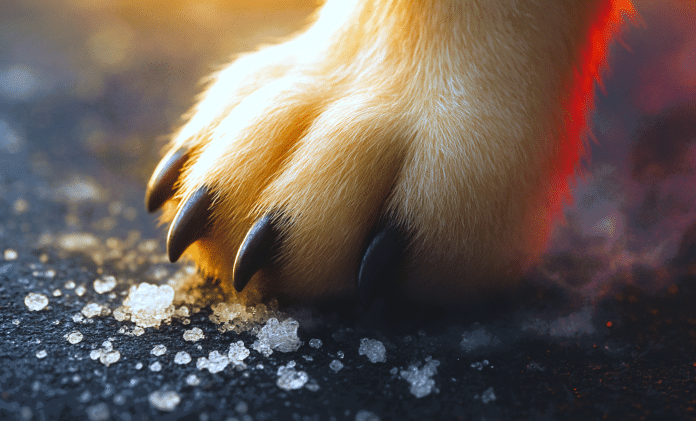New York, NY – As the first winter snows begin to fall across New York, veterinarians are reminding pet owners to take precautions during cold-weather walks. While temperatures and ice are top of mind, experts warn that the greater threat to pets this time of year comes from road salt and chemical de-icers spread across city sidewalks and highways.
Common de-icing products contain sodium chloride, calcium chloride, and magnesium chloride, which can irritate and burn paw pads on contact. The coarse salt crystals can cause cracking or sores, and when dogs lick their paws afterward, they risk ingesting toxic chemicals. Even small amounts can cause vomiting, diarrhea, excessive thirst, and lethargy, while more severe exposures may lead to seizures or kidney failure.
Veterinarians also note that some road salts and commercial ice melts contain heavy metals or industrial contaminants, posing additional risks for pets. Repeated exposure over the winter can result in long-term paw damage, dehydration, and internal health issues.
To protect pets, veterinarians recommend rinsing paws with warm water after walks and drying them thoroughly to remove any salt residue. Applying a paw balm or wax before going outdoors can help prevent irritation, while trimming fur between the toes reduces buildup of salt and slush. Booties offer the best protection for dogs that will wear them, especially during heavy snow and ice periods. Pet owners are also urged to use chloride-free, pet-safe ice melt at home.
With temperatures dropping below freezing and snow spreading from New York City to Buffalo, animal care specialists say the danger isn’t limited to northern counties. Sidewalks, parking lots, and even apartment entryways may contain salt residues that harm pets with each step.
As winter sets in across the Empire State, veterinarians stress that the biggest hazard for dogs this weekend may not be the snow or ice—but the toxic chemicals used to clear it.





